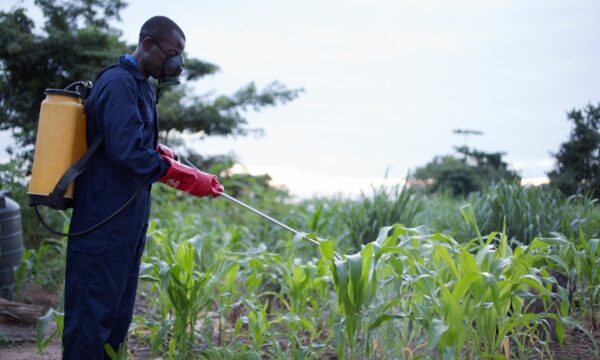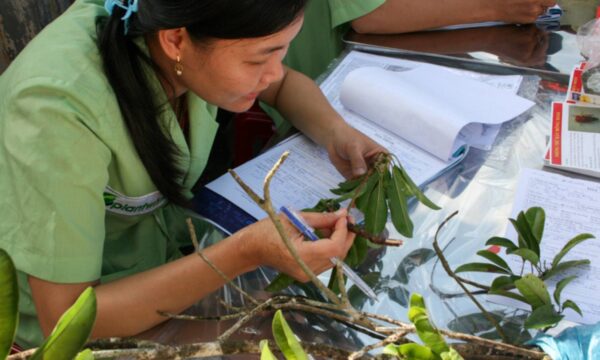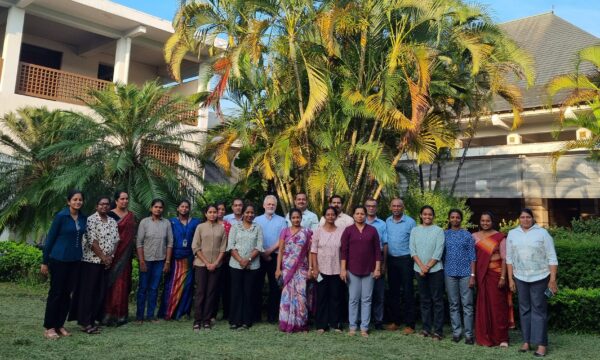How do you reach millions of farmers with tried-and-tested plant health advice? The answer is to train the plant health advisors.

In Burundi, Plantwise has been doing just this. In March 2021, Plantwise started to train plant doctors in Burundi to deliver plant health advice to farmers. And five months later, in August, Plantwise was officially launched. Plant doctor training continued throughout 2021 and 2022. By February 2023, the programme had taught 238 plant doctors and 55 Plantwise trainers.
The trainers have come from different institutions. They include extension service providers such as BPEAE. And they involved the national plant protection organization DPV, as well as local universities. Research institute ISABU is the programme’s lead implementor or National Responsible Organization (NRO). Most of the 238 plant doctors have been trained on a local level – in subsets of communes called ‘collines’.
In this blog, we look at three types of training that Plantwise has given to boost the knowledge and skills of the people who support Burundi’s farmers.
1. Managing invasive species in Burundi

Dr Stefan Toepfer is a Plantwise master trainer based at CABI’s office in Switzerland. Over the past two years, he has trained officers to diagnose and manage invasive species like fall armyworm.
Fall armyworm (Spodoptera frugiperda) is a highly damaging invasive crop pest in Africa. This caterpillar – or moth – is native to the Americas but was first discovered in Africa in 2016. It feeds on more than 80 different crop and plant species. And it’s especially damaging to cotton, maize, sorghum and sugarcane. Fall armyworm has a short reproductive cycle that allows it to spread rapidly in vast numbers. So, training in fall armyworm management is critical in countries like Burundi, where the pest has spread.
Dr Toepfer also gave a Plantwise refresher course which, among other things, covered e-clinics. This training aimed to consolidate the skills of Burundi’s plant doctors. It reviewed, for example, the use of electronic tablets to generate plant doctor prescription forms.
2. Using natural ways to control Burundi’s pests

Dr Manfred Grossrieder is a biocontrol expert based in CABI in Switzerland. As part of the training, he held a three-day workshop about biocontrol and integrated pest management. The event focussed on recognizing insects, especially beneficial insects. The officers also learned how to conserve beneficial insects to help protect crops.
The training focussed on the disadvantages of using chemical pesticides. Synthetic products generally have adverse effects on human health and ecosystems. And they also damage natural communities of beneficial insects. These include:
- insect predators – insects that feed on pests
- parasitoids – insects that grow in or on other insects, killing them
- pollinators – insects that pollinate plants
The training introduced ideas for improving plant doctor recommendations on pesticides. At plant clinics, plant doctors advise farmers on pesticides to use and to avoid. The training covered the safe and appropriate use of pesticides and minimizing non-target effects. Plant doctors also prepared lists of products that they can use for improving recommendations.
Learn more about natural biocontrol and biopesticide products at the CABI BioProtection Portal.
3. Closing the gender gap in Burundi’s agricultural sector

Bethel Terefe is CABI’s Gender Expert. Based in Kenya, she travels to countries to deliver gender training. She teaches officers how to provide gender-sensitive extension advisory services.
In Burundi, her training focused on basic gender concepts. It also covered the link between gender, agriculture and rural extension advisory services. And it looked at some of the tools that officers can use for gender analysis.
Her training also concentrated on the gender division of labour and extension services. It looked at how existing labour divisions and social norms challenge extension service providers to reach women farmers. The training opened up discussions on possible solutions.
The training included mapping institutions that are important for farming households at the community level. And it looked at gender differences and how men and women interact with these institutions.
The final sessions focused on gender-sensitive value chain analysis. It looked at solving challenges and planning for change in extension advisory practices. It also looked at approaches to increase the reach and benefit of the advisory services to men and women farmers.
Training on gender equity in Burundi continues. An approach called community conversations is helping to bring the community closer together.
Read more about Plantwise in Burundi
How community conversations help to close the gender gap in Burundi
How are plant health rallies supporting plant health in Burundi?
Study proposes measures to strengthen Burundi’s plant health system
Plantwise Burundi is financially supported by the Royal Netherlands Embassy in Burundi and NUFFIC.
For more information about Plantwise, visit www.plantwise.org
1 Comment
Leave a Reply
Related News & Blogs
How do pest risk registers address the spread of plant pests in Africa?
Pest risk registers can help to solve problems in agriculture, addressing the growing global threat of plant pests. Moreover, changing weather patterns, led by rising temperatures, are causing them to reproduce faster and expand into new regions. In ad…
10 July 2025





Thank you. Burundi is lucky to benefit a very mature plantwise programme.
Best regards